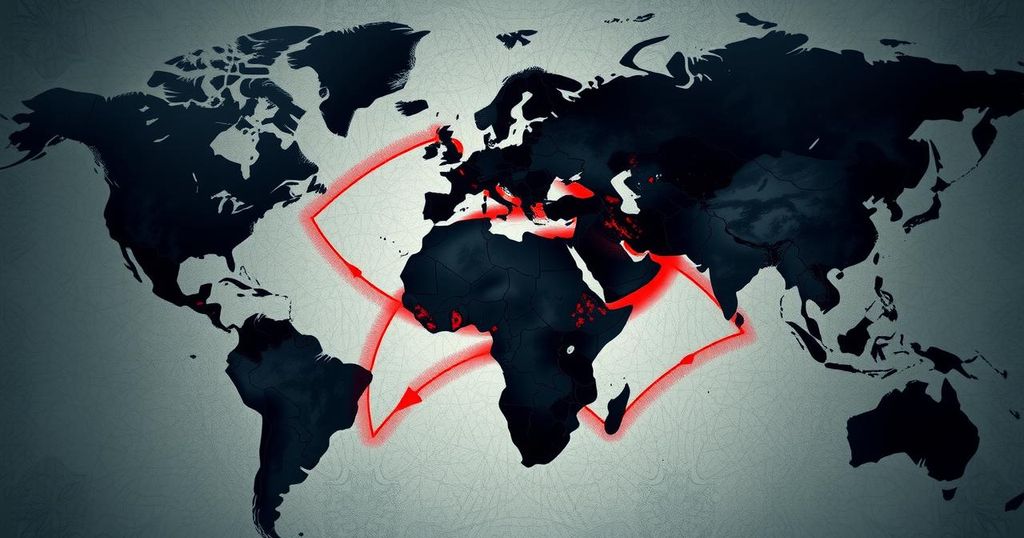Trump Threatens Aid Cuts to Jordan and Egypt Over Palestinian Refugees
President Trump has threatened Jordan and Egypt with reduced U.S. aid if they do not accept Palestinian refugees from Gaza. Both countries have rejected this proposal, viewing it as a means of displacing Palestinians. King Abdullah plans to contest the plan during his upcoming meeting with Trump, highlighting the potential for increased regional instability.
In a controversial statement, President Donald Trump has threatened to withdraw U.S. aid from Jordan and Egypt unless they agree to accept Palestinian refugees from Gaza. This demand is part of his broader initiative to facilitate a U.S.-led redevelopment of Gaza, envisioned as the “Riviera of the Middle East.” Both nations, historically receptive to U.S. support, have firmly resisted the resettlement of Palestinians, posing significant diplomatic challenges.
While meeting with reporters, President Trump indicated that failure to comply with his request could lead to a reconsideration of the sizable aid packages these countries currently receive. Jordan and Egypt have expressed deep reservations about resettling refugees, viewing such proposals as efforts by Israel to permanently displace Palestinians. Additionally, Jordan’s demographic realities complicate the situation, as a considerable proportion of its population is of Palestinian descent.
Jordan’s King Abdullah is anticipated to convey to President Trump that he opposes any plan that could incite regional chaos or exacerbate radicalism. Following previous Hamas assaults, King Abdullah reiterated a strong stance against accepting refugees, while Egyptian President Abdel Fattah el-Sisi similarly remarked on the dangers of forced migration. According to international law, particularly the 1949 Geneva Conventions, the forced displacement of occupied populations constitutes a war crime.
Despite these rejections, President Trump remains optimistic that his allies may eventually acquiesce, suggesting that they possess “good hearts” when it comes to humanitarian efforts. U.S. military and economic support for Jordan typically exceeds $1 billion annually, while Egypt receives a similar level of assistance. As Jordan’s opposition to Trump’s refugee proposal grows, U.S. officials maintain a delicate balance to avoid alienating these key allies in the region.
In a further twist, President Trump recently indicated that he does not foresee displaced Gazans retaining their right to return after the redevelopment. He expressed confidence in establishing agreements with Jordan and Egypt to house refugees. Israeli Prime Minister Benjamin Netanyahu has lauded Trump’s concepts, framing them as potentially transformative.
Amidst heightened tensions, displaced Gazans have started returning to their homes following an Israeli troop withdrawal. Concurrently, the fragile ceasefire in Gaza is in jeopardy, with Hamas declaring an end to hostage releases, alleging Israeli violations. In response to Hamas’s stance, President Trump demanded the safe release of hostages or threatened to advise a suspension of the ceasefire, igniting criticism from Hamas leaders regarding the efficacy of threats in negotiations.
Finally, King Abdullah’s visit to Washington is poised to include discussions with key U.S. officials, continuing a dialogue critical for diplomatic relations in the Middle East. His meeting signifies a noteworthy foreign engagement, adding to the complexities of U.S. foreign policy in the region.
President Trump’s ultimatum to Jordan and Egypt regarding Palestinian refugees marks a significant intensification of U.S. foreign policy in the Middle East. The refusal of these nations to accept refugees reflects historical, demographic, and legal complexities that challenge the proposed plan. The delicate political landscape underscores the potential consequences of such policies, particularly in regard to regional stability and the fight against extremism. Ultimately, the outcomes of these discussions will shape future U.S.-Middle East relations.
Original Source: www.telegraph.co.uk








Post Comment